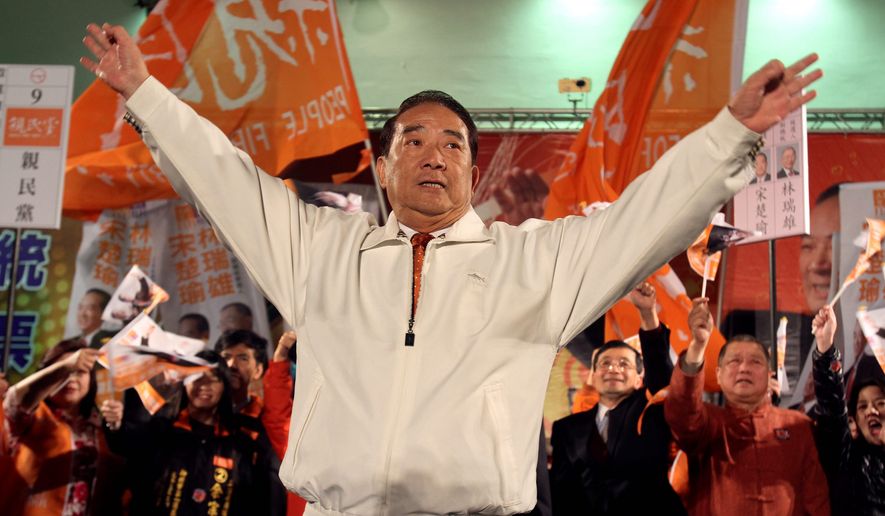He is the most enigmatic figure in Taiwanese politics. Admired by many, loathed by some but courted by most, he has commanded attention in all of the island’s key elections and helped decide the outcome in the most crucial ones since Taiwan embraced full-blown democracy in the 1990s.
This week, James Soong once again displayed his ability to jolt the political landscape by announcing that he just might jump into the crucial 2016 presidential race, further complicating a contentious and spirited campaign season that had been shaping up as a race between two women, Tsai Ing-wen of the main opposition DPP and Hung Hsiu-chu of the ruling Nationalist Party (KMT).
Mr. Soong is a charismatic politician who, despite his deep roots in the KMT, has often proved to be his own party’s worst enemy by derailing the bids of several establishment candidates for high office. For the past two decades, he mainly has acted as founder and chairman of the People First Party, a junior partner in the KMT-led Pan-Blue Coalition, but with an independent streak, often crossing the deepening KMT-DPP divide.
Born into a navy family with unwavering loyalty to the KMT and its former leader Chiang Kai-shek, Mr. Soong, 73, was groomed to be a key member of the party’s elite. He trained in the U.S. as a political scientist, with graduate degrees from Berkeley and Georgetown, where he honed his analytical skills and a near-perfect command of English. In 1974, Mr. Soong returned to Taiwan and quickly became a confidant and English interpreter for Chiang Ching-kuo, Chiang Kai-shek’s son, who became president in 1978. Mr. Soong interpreted on several occasions for President Chiang and fellow Georgetown alumnus Bill Clinton, who as governor of Arkansas visited Taiwan several times to negotiate agricultural deals.
Chiang Ching-kuo was instrumental in introducing democratic reforms and ditching one-party dictatorship in Taiwan in the 1980s. When Chiang died in 1988, Mr. Soong played a critical role in fending off fierce KMT establishment resistance and helped Chiang’s heir apparent, Vice President Lee Teng-hui, a Taiwanese, not a mainlander, become president. Mr. Lee faithfully carried out Chiang Ching-kuo’s democratic reforms and oversaw a democratic election in 1996, becoming the first democratically elected head of a government in Chinese history, a move that sparked intimidating missile firings by Beijing near Taiwan.
The hard-core KMT establishment has never forgiven Mr. Soong for his role in aiding Mr. Lee’s ascent and on several occasions has blocked Mr. Soong’s nomination as the KMT candidate, despite his undying presidential ambition and personal popularity.
Mr. Soong’s announcement Wednesday is widely seen as a major blow to the KMT’s incumbent president, Ma Ying-jeou, and the relatively unknown KMT candidate Hung Hsiu-chu, whose meteoric rise from bureaucratic obscurity in a matter of weeks underscores the desperation of KMT leaders, despite the doubts about her chances against a seasoned and popular opponent such as the DPP’s Ms. Tsai.
If Mr. Soong enters the race, he would all but certainly doom Ms. Hung’s candidacy, as most of Mr. Soong’s supporters would come from the KMT-led Pan-Blue coalition. Mr. Soong would in effect be Taiwan’s Ross Perot, whose third-party bid badly undercut President George H.W. Bush in his 1992 race for re-election and — many believe — helped Mr. Clinton win the White House.
This is not the first time Mr. Soong has split the KMT votes to help the opposition. In 2000, he was instrumental in helping the opposition DPP’s candidate, Chen Shui-bien, win the presidency with only 39.3 percent of the votes. In that race, Mr. Soong took 36.84 percent of the vote, while the KMT’s establishment candidate, incumbent Vice President Lien Chan, won just 23.1 percent.
After the 2000 election fiasco, the KMT recognized Mr. Soong’s popular appeal and persuaded him to enter the 2004 presidential race as vice presidential candidate with Lien Chan against Mr. Chen. Again, the KMT miscalculated — Mr. Soong had alienated some KMT voters four years earlier, and some of Mr. Soong’s own People First Party voters were unhappy with joining the KMT ticket. As a result, many did not vote for the Lien-Soong ticket, giving Mr. Chen a stunning re-election victory by the thinnest of margins. On Wednesday, Mr. Soong blasted the KMT, calling it “the fake Chinese medicine” seen on TV dramas. As for the KMT, the ultimate nightmare, of course, will be Mr. Soong teaming with DPP’s Ms. Tsai as her running mate.
• Miles Yu’s column appears Fridays. He can be reached at mmilesyu@gmail.com and @Yu_miles.
• Miles Yu can be reached at yu123@washingtontimes.com.




Please read our comment policy before commenting.